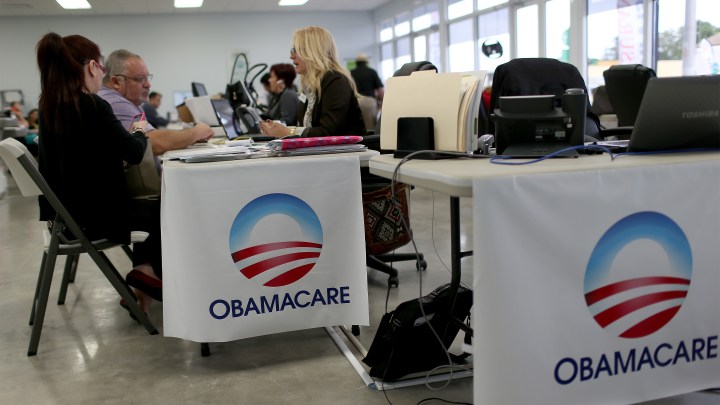
With COVID-19, some states reopen the ACA marketplace for uninsured
With COVID-19, some states reopen the ACA marketplace for uninsured

At the end of 2019, Americans had a set period that ended in December to shop for a health care plan under the Affordable Care Act, often called Obamacare.
These plans are federally subsidized, making them cheaper for those who qualify to buy one. Some states have their own Obamacare marketplaces, though most rely on the federal one at healthcare.gov.
Now with the COVID-19 pandemic, an infection could mean massive medical bills for people who are uninsured.
While the federal health exchange isn’t reopening, about a dozen states and Washington, D.C., have reopened for people who skipped the December enrollment period to sign up for health insurance.
The states that reopened their ACA marketplaces are California, Colorado, Connecticut, Maryland, Massachusetts, Minnesota, Nevada, New York, Rhode Island, Vermont and Washington, though some have recently closed because their special enrollment deadline has passed. Idaho reopened its exchange, but mainly for people who’ve had a job loss related to COVID-19.
For Paris Barnes, a health care navigator in the city of Baltimore, work these days starts with a phone call.
“So the phone would ring and, you know, I would introduce myself,” Barnes said. “‘HealthCare Access Maryland, this is Paris. How may I help you?’ And the client would then tell me what they need from me.”
Barnes helps people figure out the best coverage plan to meet the needs and budget of shoppers calling, and she does it through Maryland’s exchange. She’s done this work for six years, but the new part of the job is answering their COVID-19 concerns.
“They’re just simply afraid that if they don’t have anything, will they be denied treatment, or will they not receive fair treatment, or will they not be able to get screened?” Barnes said.
Most of Barnes’s new clients are younger — the majority of Maryland’s enrollees this new period range from 26 to 34. Many work in restaurants or in other jobs that often don’t offer health benefits.
“It’s a health plan that’s accessible and available to gig workers to self-employed people to individuals, and I think that’s why we see the influx of enrollment,” said Trish Riley, executive director of the National Academy for State Health Policy.
Take Nevada’s marketplace. State data shows that during its special enrollment period, it had about 680 enrollees in February, and by March, that was up to roughly 1,900.
Enrollees like Chase Lee in Las Vegas, who’s 24, and until recently, had two restaurant jobs but no health insurance coverage. Before the pandemic, he had no plans to buy insurance.
“Probably I wouldn’t have thought about it twice,” Lee said. “I just assumed that I would just kind of try and be healthy and take care of myself.”
But his parents got on his case.
“My dad kept telling me, ‘Make sure you get insurance with this going on.’ Who wants to, you know, build up a $50,000 emergency room bill that you can’t pay after it’s all said and done?” Lee added.
So Lee turned to a navigator at the Las Vegas Asian Community Resource Center when Nevada reopened its exchange.
“If it wasn’t for the COVID-19, I wouldn’t have an option but to wait the entire year to try and get open enrollment next November,” he said.
Lee chose one that costs $55 a month — a low-level plan that has an affordable monthly premium but that requires higher out-of-pocket payments to meet a deductible before the coverage kicks in. In the past, that has been a barrier for some low-income people.
“Their affording the insurance is a trade-off,” said Alok Sarwal, the executive director of the Colorado Alliance for Health Equity and Practice in Denver.
COVID-19 has changed that calculation for some, though, Sarwal said.
‘Now their priority and risk is so high that it’s a life-and-death decision, that they are forced to buy insurance,” Sarwal added. “So those are very sobering facts for them.”
Those who buy insurance also need to be aware of which doctors and hospitals the plans include, so that they do not get stuck with out-of-network costs. These are the kinds of points Paris Barnes in Baltimore explains to people who come to her for help signing up for a plan there, but in the past, she enjoyed seeing her clients in person.
“We honestly hope that we’re not, you know, stricken to the phone forever and ever,” she said.
States that have reopened enrollment do have deadlines — some have already passed and others end soon. Maryland’s enrollment is scheduled to close June 15.
There’s a lot happening in the world. Through it all, Marketplace is here for you.
You rely on Marketplace to break down the world’s events and tell you how it affects you in a fact-based, approachable way. We rely on your financial support to keep making that possible.
Your donation today powers the independent journalism that you rely on. For just $5/month, you can help sustain Marketplace so we can keep reporting on the things that matter to you.


















